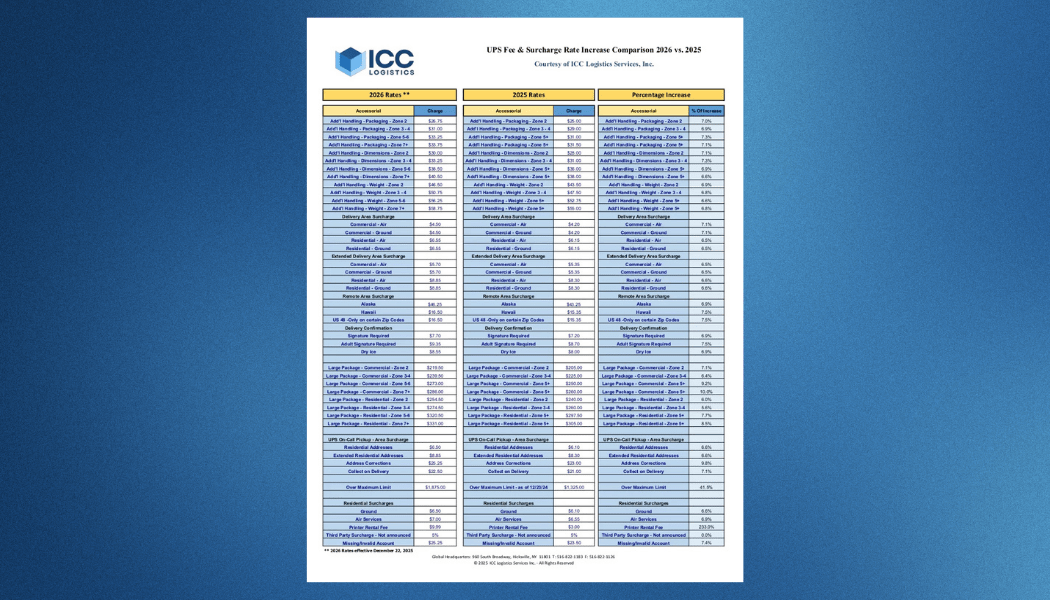How a proactive and balanced approach gives the shipper an upper hand
Every logistics manager knows the vital importance of balancing their carrier relationships while at the same time focusing on the need to continually control corporate transportation expenses. All transportation carriers whether Parcel, LTL/Truckload or International Service Providers, obviously publish rates and create pricing agreements to maximize THEIR OWN PROFITABILITY. Certainly, no surprise here.
So, unless you take a proactive approach to rate and contract negotiations, you will continue to remain in an uncompetitive position year, after year, after year. These carriers factor in a multitude of variables into their contracts and pricing agreements, including dozens of surcharges, countless ancillary charges, varying incentives based on any number of factors, as well as complex service terms and conditions. Some even contend, this is done intentionally so that comparing competing carrier’s rates, services as well as various contract terms and conditions will be very difficult, if not impossible. So, is all of this being done in an effort to discourage shippers from changing the status quo? Perhaps!
One might even say the carriers clearly have the upper hand in these negotiations and the shippers are almost always at their mercy. This fact is absolutely true for many companies. It is certainly true for those companies that choose to go it alone in contract negotiations. Or, for those companies that decide to utilize individuals within their organizations to negotiate these rates and service agreements when in fact those individuals have absolutely no experience in freight cost negotiations. Sad to say, but this happens way too often and therefore many companies do remain at the mercy of their freight carriers.
One of the fundamental philosophies of successful negotiating is to ensure you always negotiate from a “position of strength.” Companies that continually negotiate from a position of strength ensure their company receives the best deal possible, all of the time!
So, how can your company ensure it is always negotiating from a position of strength? We have some key points for you to consider ensuring your company always receives the “best possible deal” in all transportation and logistics negotiations.
- Know who you’re negotiating with Not only the person or person’s you’ll be across the negotiating table from, but what authority does that individual or individuals have to ensure you of getting the best deal. Does he or she have to go back to their management to get approval for anything that is agreed to at this meeting? If so, you’re negotiating with the wrong person or persons. On the other side of the coin, if you have to go to your management to “make the deal” you’re not the right person to be in this negotiating session either. The ideal situation is to be prepared to lock in the best deal, (for both parties) at the negotiating table.
- Know upfront exactly what has to happen at the end of the negotiating session. If you don’t have a plan in place that spells out everything you want to achieve and perhaps more importantly, need to accomplish from this negotiation session, you are totally unprepared. You’ve set yourself and your company up for failure. Without a comprehensive set of goals, (ideal and secondary), “give backs”, (issues you are willing to agree to let the carrier have), it is better to put off the negotiating session. Never enter into any negotiations without having all your ducks in a row. This includes what I MUST have; what I’ll ACCEPT; and what I will WALK AWAY from.
- You must have comprehensive bench-marking data in order to clearly understand what you are entitled to. Bench-marking data is critical in any pricing and contract negotiation because you need to know the rates, incentives, rules and regulations the freight carriers have been providing to your competitors or other shippers with similar shipping characteristics. Without this information you will be at a distinct disadvantage. The shipping carriers have comprehensive analytics and use data science to determine exactly what rates, discounts, incentives, contract terms and conditions they need and want you to accept. Therefore you will need the same level of sophisticated information to level the negotiating playing field.
- The True Value of Benchmarking. The effective use of comprehensive benchmarking data will enable shippers and their logistics executives to enjoy a competitive advantage over many of their competitors. Crucially, for a benchmark analysis to be truly valuable, it needs to reflect the actual prices being agreed to and traded across your specific marketplace. You need someone to analyze the lanes, rates, minimum charges, dimensional weight provisions, if any, surcharges, accessorial fees, delivery density, incentives, annual rate increases, contract terms, conditions and overall pricing. Bench-marking directly supports your contract negotiations and offers numerous significant benefits. Benchmarks speed up the negotiation process while continuing to minimize risks. Bench-marking data paints a clear picture of your true shipping costs – enabling you to be confident in what you’re asking the carriers to commit to. It saves you time, Identifies core points where contractual improvements and meaningful cost savings can be achieved and finally, it will provide clear analytics, strong strategy and coaching for direct negotiations to build trust on both sides of the negotiating table.
- Don’t go it alone. If you decide to “go it alone” or have inexperienced negotiators responsible for getting what your company needs, you’re going to pay much more than you should. Think about what shipping issues exist both in your company and with the carriers you pay for services. To be truly successful, you’ll need someone who understands the internal rate approval processes and various profit models. Consult with an objective third party expert and understand ALL of your options to not only create your logistics wish-list, but to ensure your company gets everything on that wish-list, without sacrificing service.
- Change the dynamics in your negotiations by leveling the playing field. You must have the same effective analytics and data science that the carriers have on you and your company; align the field. Shipping costs keep rising, and you could be missing major opportunities for cost and service improvement.
Once you have transportation and logistics contracts that are operationally and financially beneficial for you and the shipping carriers, you can grow a very profitable relationship for both parties. From this base all other benefits are built – Better Price, Convenience and Selection, all which adds up to happy customers and a growing business.
We’d love to have a conversation with you about your carrier contract negotiations and how to ensure you get the very best deal. We look forward to hearing from you!



 to receive our FREE white papers:
to receive our FREE white papers: